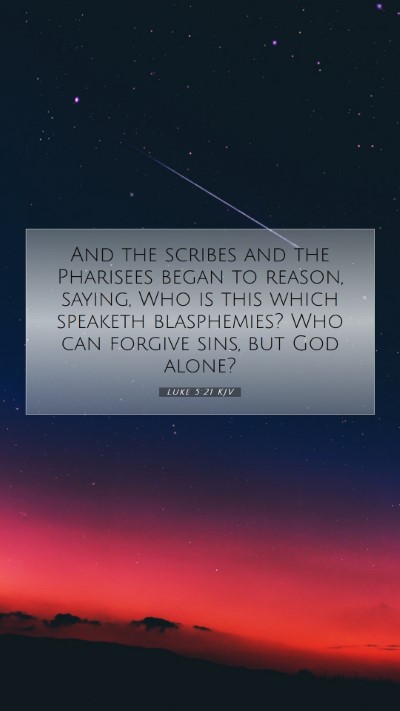Understanding Luke 5:21
Luke 5:21 states, "And the scribes and the Pharisees began to reason, saying, Who is this which speaketh blasphemies? Who can forgive sins, but God alone?" This verse presents a pivotal moment in Jesus' ministry, one that raises important theological inquiries and provokes significant reactions from the leaders of the Jewish faith.
Bible Verse Meanings
The meaning of this verse can be distilled through various biblical commentaries:
- Matthew Henry: This commentary highlights the incredulity of the scribes and Pharisees. When they hear Jesus proclaim forgiveness, they perceive it as a direct affront to God's authority, indicating a misunderstanding of the nature of the Messiah.
- Albert Barnes: Barnes emphasizes the theological implications of this moment. He points out that the challenge to Jesus’ authority underscores the conflict between the established religious order and the new teaching that Jesus brings, which redefines the relationship between God and humanity.
- Adam Clarke: Clarke dives into the details, noting that the term "blasphemies" speaks to the scribes' concerns regarding Jesus’ identity. They believed only God had the right to forgive sins, thus questioning Jesus’ divinity as they struggled to comprehend His role as the Son of God.
Bible Verse Interpretations
From these commentaries, we can glean comprehensive insights into this scripture:
- Challenge to Authority: The response of the scribes and Pharisees reflects a broader resistance to change and the divine authority that Jesus claims.
- Divine Nature of Forgiveness: The verse illustrates a key teaching of Christianity: that forgiveness originates from God, and through Jesus, that forgiveness is accessible to humanity.
- Foreshadowing Conflict: This incident foreshadows an ongoing conflict that Jesus will face from religious authorities, which plays out throughout the Gospels.
Understanding Scripture
This verse is pivotal in various contexts:
- Historical Context: Understanding the Jewish context in which Jesus preached is vital. The Pharisees were known as strict interpreters of the Law, and their approach contrasts with the grace Jesus offered.
- Theological Significance: The question posed by the scribes raises issues about Christology, the study of the nature and work of Christ, leading to discussions on His divine authority.
- Practical Application: Believers today can reflect on the divine gift of forgiveness and how it impacts personal relationships, encouraging them to extend grace to others as they have received it.
In-depth Bible Verse Analysis
To gain a fuller understanding of Luke 5:21, it’s important to consider:
- Critique of the Religious Elite: This moment serves as a critique of the religious leaders of the day and their inability to recognize God’s work through Jesus.
- Jesus' Authority: This passage asserts Jesus' authority to forgive sins, which becomes a hallmark of His ministry and a topic of much theological discussion.
- Transformation and Renewal: The teachings of Jesus invite transformation, undermining the rigid structures of the religious system that had become prevalent.
Significance of the Verse
Overall, the significance of Luke 5:21 is manifold:
- This verse highlights the tension between Jesus and religious authorities, an essential theme in the Gospels.
- It reinforces the central Christian doctrine of forgiveness found in Jesus as the Messiah.
- The verse invites believers to consider their own understanding of authority, grace, and the nature of God’s forgiveness.
Additional Bible Cross References
Consider also these additional Bible verses that relate to Luke 5:21:
- Mark 2:7: "Why doth this man thus speak blasphemies? who can forgive sins but God only?"
- Matthew 9:3: A parallel instance where the scribes question Jesus' authority to forgive sins.
- Isaiah 43:25: God speaks of His authority to forgive sin, establishing the foundation for understanding forgiveness.
Conclusion
This comprehensive analysis of Luke 5:21 sheds light on both the immediate and profound implications of the verse. Through the lens of Bible study insights, readers can appreciate not just the historical context, but also the ongoing relevance of forgiveness in the gospel message. For those seeking a deeper understanding of Scripture, exploring such Bible verse explanations is essential in their spiritual journey.


